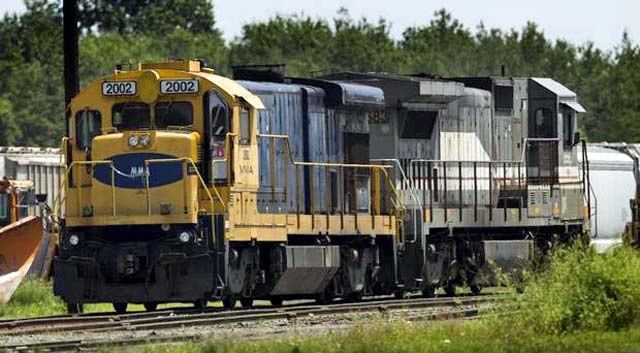

Montreal Maine & Atlantic locomotives in the company yard at Farnham, Quebec - Date unknown Peter Power.
18 August 2013 MM&A Could Prove a Bargaining Chip
for Irving's Pipeline Ambitions Saint John New Brunswick - The sprawling Irving business empire touches virtually everything built, moved, fuelled, or harvested in Atlantic Canada.
So what might the Irvings want with the remains of tiny Montreal Maine & Atlantic Railway Inc. (MMA), the company at the centre of the Lake Megantic rail disaster?
Shut down by federal regulators and hounded by creditors in bankruptcy court, the railway might not seem like much of a prize. (The Canadian Transportation Agency lifted its suspension on Friday because it said the railway has adequate insurance to keep operating for the next month and a half.) But the company's assets, including rail lines linking Maine, New Brunswick, and suburban Montreal, could prove very useful to the Irvings, both operationally and politically.
J.D. Irving Ltd. is already in the rail business. It owns NB&M Railways, which operates nearly 900 kilometres of track in Maine and New Brunswick, parts of which it acquired from MMA earlier this year and in 2011. The train that crashed in early July was delivering U.S. crude oil to the Irving refinery in Saint John. MMA's line helped Irving diversify the refinery's sources of crude.
Irving's rail subsidiary is also one of MMA's largest unsecured creditors, owed about $2-million. But there is another, more strategic reason why MMA could prove valuable to the Irvings. Rescuing MMA from its current predicament would curry favour with both the federal and Quebec governments. Ottawa and Quebec hold the key to a much more important prize for Irving, the $12-billion Energy East pipeline project. The pipeline would bring Alberta crude to the East Coast by reversing an existing natural gas pipeline and then extending it right through the heart of Quebec.
If the project proceeds, Irving said it will build a $300-million terminal at its refinery in Saint John, a vital piece of the national infrastructure that would provide an outlet to overseas markets for trapped Canadian oil.
Irving and the pipeline operator TransCanada Corp. need Quebec on-side to make the project happen, something that's far from a given.
So far, Quebec Premier Pauline Marois' minority Parti Quebecois government is playing it coy about whether it will put up roadblocks to the pipeline. The project is unpopular with Quebec environmentalists, who don't want Quebec to be part of the oil economy.
The opposition Liberals and Coalition Avenir Quebec seem much more open to the project, which would likely generate huge economic spin offs for the provinces, along with thousands of jobs.
The pipeline needs Quebec's support. Without it, the project could be doomed.
In the Irvings' hands, MMA would have political leverage.
The railway's abrupt shutdown is bad for the Quebec economy. The last thing Quebec wants is a permanent closing.
The railway's days of transporting crude may be over. But MMA tracks remain a vital part of the transportation infrastructure for manufacturers across a swath of eastern Quebec. Its rail lines serve the cities of Ste Hyacinthe, St. Jean, Farnham, Cowansville, Magog, and Sherbrooke linking these centres to Montreal, Maine, Vermont, and beyond.
A buyout of MMA would not be without complications. The cleanup costs, estimated by MMA to top $200-million, helped push the railway to seek court protection from creditors earlier this month because its insurance policy would only cover a fraction of the bill.
Sorting out MMA's legal, financial, and environmental woes could drag out in court for months, if not years.
Nonetheless, putting the railway in more stable hands should be a priority for both the Quebec and federal governments.
Irving would have something Quebec wants.
Quebec, likewise, has something Irving wants.
It wouldn't be the first time that Quebec and the Irvings find themselves on the same side of a major energy project. Irving backed the aborted 2010 deal that would have seen Hydro-Quebec buy most of the assets of NB Power, the provincially owned power utility. Irving saw the deal as an opportunity to get cheaper electricity rates for New Brunswick industry. The province eventually backed out, but the episode demonstrates the potential for finding economic common ground between the provinces.
In troubled MMA, Quebec, Ottawa, and the Irvings just might find another, and perhaps more satisfying, confluence of interests.
Barrie McKenna.



Vancouver Island
British Columbia
Canada
|